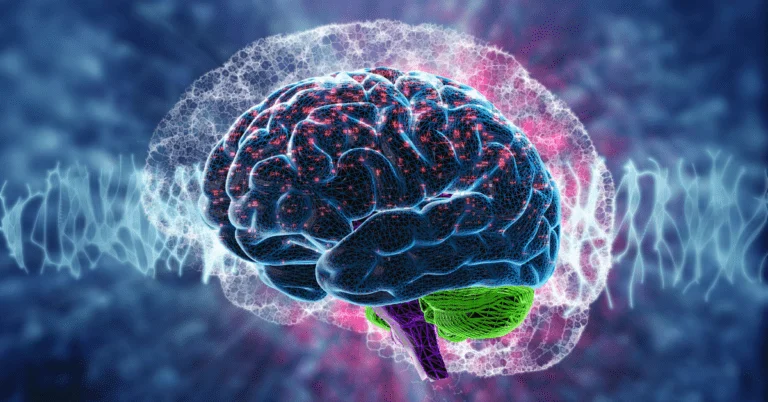Alcohol Abuse vs Dependence: Definition, Differences, Causes and Rehabilitation
Alcohol abuse vs. dependence states that abuse involves harmful drinking patterns without full physical reliance, while dependence includes tolerance and withdrawal, with causes rooted in social, psychological, and biological factors, and rehabilitation requiring counseling, medical treatment, and long-term support.
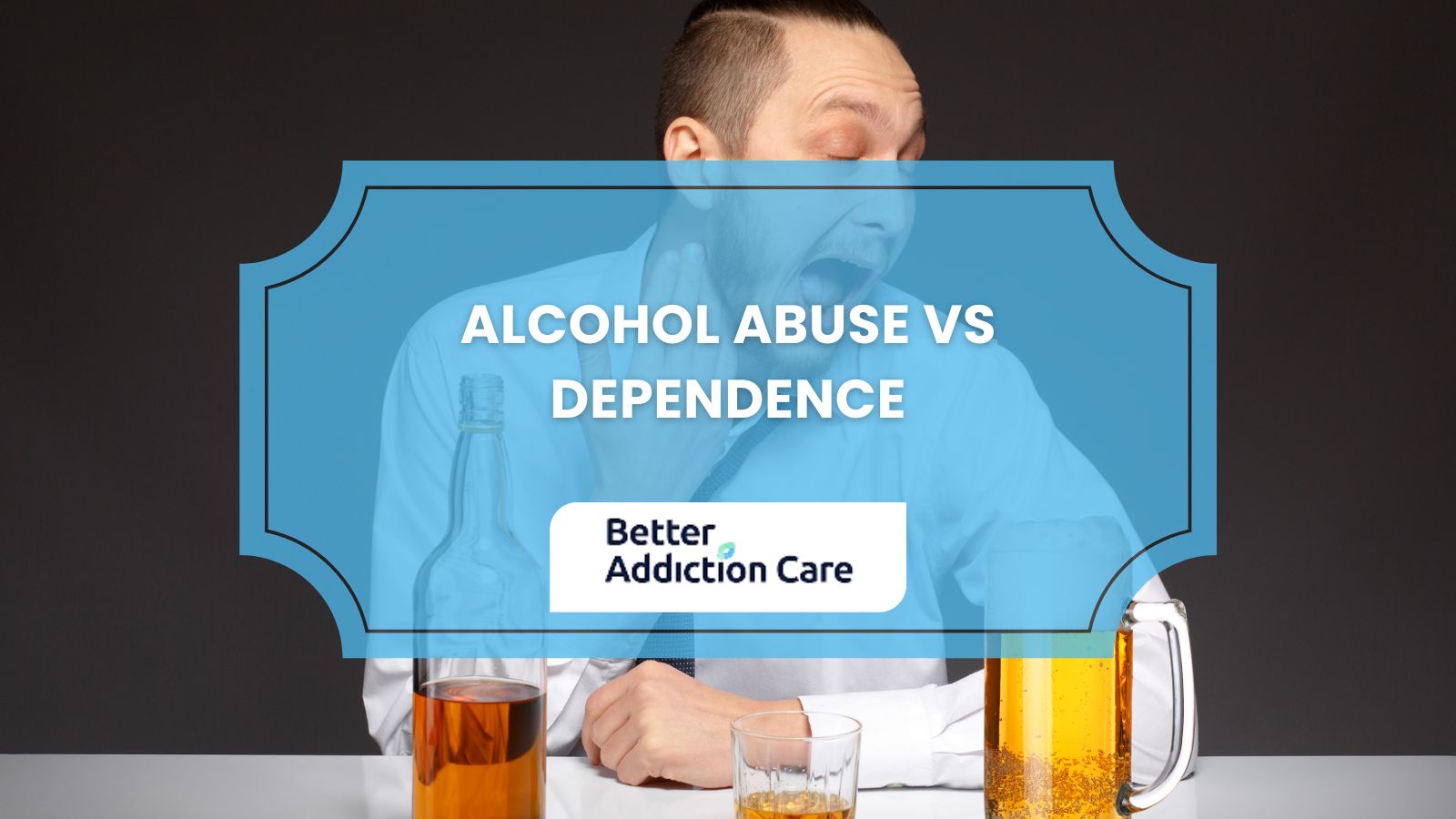
Alcohol abuse vs. dependence states that abuse involves harmful drinking patterns without full physical reliance, while dependence includes tolerance and withdrawal, with causes rooted in social, psychological, and biological factors, and rehabilitation requiring counseling, medical treatment, and long-term support.
Physical dependence is absent in alcohol abuse. Physical dependence is present in alcohol dependence, accompanied by tolerance and withdrawal symptoms. Individuals with alcohol abuse maintain some control over drinking behavior. In contrast, individuals with alcohol dependence lose all control over their drinking.
According to the 2023 National Survey on Drug Use and Health (NSDUH), 28.9 million people ages 12 and older (10.2% in this age group) had Alcohol Use Disorder (AUD) in the past year.
Consequences of alcohol abuse include neglect of responsibilities and legal issues, while dependence leads to severe health problems and persistent drinking despite harm. Withdrawal symptoms are absent in abuse but are life-threatening in dependence. Treatment for alcohol abuse includes counseling and support groups, while dependence requires comprehensive treatment, including detoxification and rehabilitation.
What is Alcohol Abuse?
Alcohol abuse is a pattern of drinking that negatively impacts a person's relationships, responsibilities, and health. Alcohol abuse involves regularly disregarding important obligations at work, school, or home due to alcohol consumption, resulting in poor performance across these areas. People who abuse alcohol engage in risky behaviors, such as driving or operating machinery while intoxicated, increasing their chances of accidents and injuries.
Alcohol abusers frequently experience legal problems related to DUIs, violence, and other alcohol-related offenses. Alcohol abuse causes interpersonal difficulties, including recurring arguments with family members, strained friendships, and challenges in maintaining personal relationships. Despite recognizing negative consequences, alcohol abusers continue drinking, further damaging their personal and professional lives.
Alcohol abuse does not always lead to physical dependency. However, alcohol abuse substantially harms health and relationships. Early intervention prevents progression into severe alcohol dependence, which requires intensive treatment for sobriety. Recognizing signs of alcohol abuse in oneself or loved ones minimizes negative impacts and prevents the development of more serious alcohol use disorders.
What is Alcohol Dependence?
Alcohol dependence is a chronic medical condition characterized by an inability to control alcohol consumption due to both physical and psychological reliance on alcohol. Also known as alcoholism or alcohol use disorder (AUD), Alcohol dependence develops when regular alcohol consumption creates changes in brain chemistry, leading to tolerance, withdrawal symptoms, and compulsive drinking behaviors.
main indicators of alcohol dependence include developing tolerance (needing more alcohol to achieve the same effects), experiencing withdrawal symptoms when not drinking (trembling, sweating, nausea, anxiety), drinking larger amounts or for longer periods than intended, persistent failed attempts to cut down, spending excessive time obtaining or recovering from alcohol, abandoning important responsibilities, and continuing to drink despite negative health and social consequences.
Severe alcohol dependence leads to dangerous withdrawal symptoms, including seizures and delirium tremens. Medical supervision during detoxification is essential. Alcohol dependence affects millions of Americans across all demographics. Treatment for alcohol dependence requires a combination of medical detox, counseling, behavioral therapies, and ongoing support.
What Is Alcohol Abuse Versus Alcohol Dependence?
Alcohol abuse refers to harmful drinking behaviors such as neglecting responsibilities or engaging in risky activities, while alcohol dependence involves physical and psychological reliance marked by tolerance, withdrawal, and compulsive use. Historically, Alcohol abuse and alcohol dependence were distinct DSM-IV diagnoses, but research showed they existed on a spectrum of severity. In DSM-5, both terms were merged under Alcohol Use Disorder (AUD) to simplify diagnosis, reduce stigma, and better reflect clinical reality.
What Are The Differences Between Alcohol Abuse vs. Dependence?
The differences between alcohol abuse and dependence include the nature of the drinking patterns, the presence of physical addiction, and the severity of the consequences experienced by individuals.
Alcohol abuse involves harmful drinking that negatively affects various life aspects without physical addiction, while alcohol dependence, or alcoholism, includes both physical and psychological reliance on alcohol, marked by tolerance, withdrawal symptoms, and a complete loss of control over drinking.
Alcohol abuse presents as problematic drinking with a lack of control. This behavior results in neglected responsibilities, legal issues, and relationship problems. Treatment involves counseling, support groups, and behavioral modifications.
Alcohol dependence signifies a complete loss of control over drinking. This condition includes physical dependence, tolerance, and potentially life-threatening withdrawal symptoms upon cessation. Alcohol dependence causes severe health complications and life disruption despite evident harm. Comprehensive treatment requires medical detoxification and rehabilitation programs.
The table below shows the main differences between alcohol abuse and alcohol dependence.
|
Characteristic |
Alcohol Abuse |
Alcohol Dependence |
|
Definition |
Harmful drinking patterns cause negative consequences for every aspect |
Physical and psychological reliance on alcohol |
|
Physical Dependence |
Not present |
Present with tolerance and withdrawal symptoms |
|
Control Over Drinking |
Some control, but usually, there is a pattern of problematic drinking |
Loss of control over drinking |
|
Consequences |
Neglect of responsibilities, legal issues, and interpersonal problems |
Severe health issues, life disruption, persistent drinking despite harm |
|
Withdrawal Symptoms |
Absent |
Present, and is life-threatening |
|
Treatment Required |
It is often managed with counseling, support groups, and behavior modification. |
Requires comprehensive treatment, including detox and rehab |
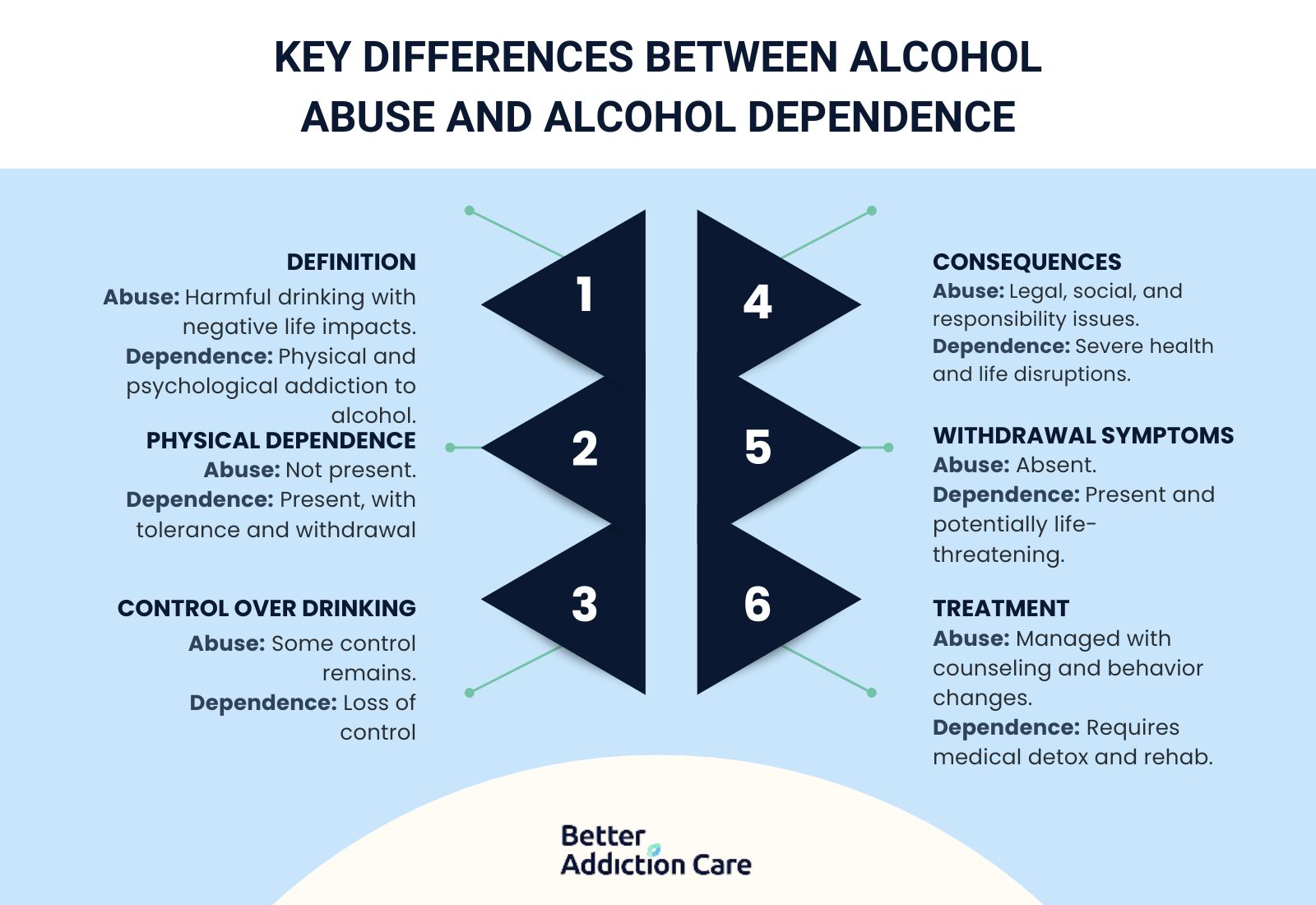
What Are the Causes of Alcohol Abuse vs. Dependence?
The causes of alcohol abuse stem from social influences, stress, or cultural norms, while alcohol dependence develops through prolonged heavy use that alters brain chemistry, leading to tolerance, cravings, and withdrawal.
Alcohol abuse and dependence cause a complex interplay of genetic, psychological, social, and environmental factors. While abuse refers to harmful patterns of drinking, dependence involves physical addiction and withdrawal symptoms.
Genetic predisposition plays an important role in both conditions, with family history increasing susceptibility to developing alcohol problems. According to Kranzler, Henry R.’s 2023 study, ‘Overview of Alcohol Use Disorder’, alcohol use disorder has a 49% genetic heritability, with environmental factors like childhood abuse and household instability accounting for the remaining risk. Neurochemical changes occur in the brain after prolonged alcohol use, affecting neurotransmitter systems and reinforcing dependence.
Psychological factors such as trauma, stress, mental health disorders, and poor coping mechanisms contribute to alcohol misuse as individuals seek escape from emotional distress. Environmental influences, including peer pressure, cultural attitudes toward drinking, and early alcohol exposure, impact drinking behaviors.
Social determinants like family dynamics, economic status, and access to alcohol further shape drinking patterns. Meanwhile, personality traits including impulsivity and low self-esteem increase vulnerability to problematic alcohol use.
Though alcohol abuse and dependence share many causal factors, dependence involves more profound physiological changes and psychological attachment to alcohol. Understanding these distinctions helps healthcare providers develop targeted prevention strategies and personalized treatment approaches for individuals struggling with alcohol-related disorders.
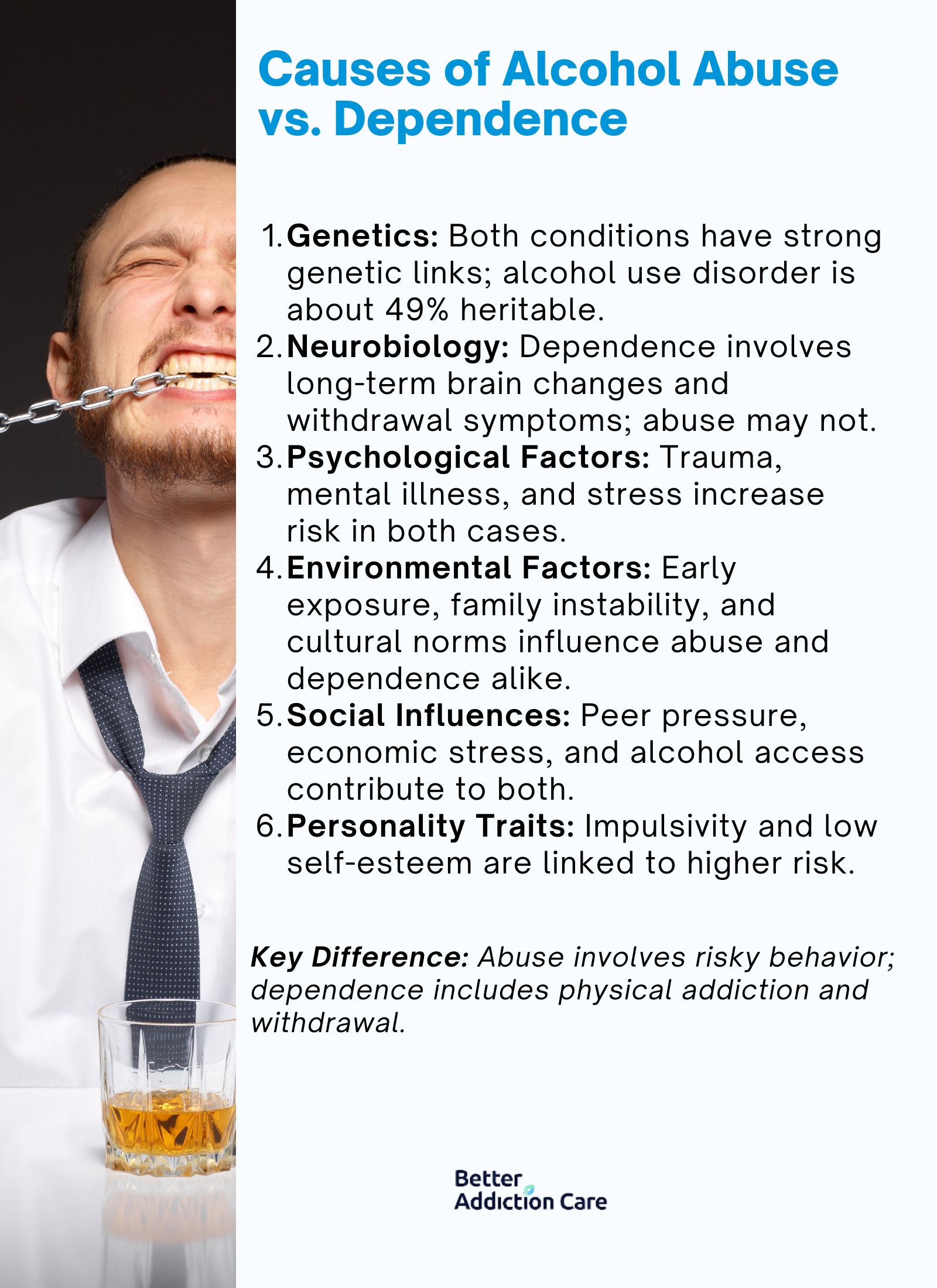
How To Find A Local Alcohol Rehab Facility for Alcohol Dependence Treatment?
You can find a local alcohol rehab facility for alcohol dependence treatment by searching accredited centers through resources like the SAMHSA treatment locator, consulting healthcare providers, or seeking referrals from local support groups and community health services.
Ask your primary care physician for referrals based on your needs. Utilize governmental resources like SAMHSA's treatment locator service for nationwide facility information.
Better Addiction Care connects individuals struggling with alcohol dependence to appropriate treatment programs nationwide. Our network includes local alcohol rehab facilities offering various care levels from detoxification to inpatient and outpatient programs. Our treatment specialists match patients with programs addressing their specific needs and circumstances.
Treatment centers in our network provide evidence-based therapies, including medical detoxification, medication-assisted treatment, counseling, and aftercare planning. Many facilities accept various insurance plans and offer flexible payment options. Call our 24/7 helpline at (800) 429-7690 to speak with a specialist who will guide you through finding appropriate alcohol dependence care.
Why Did the DSM-5 Combine Alcohol Abuse and Dependence Into AUD?
The DSM-5 combined alcohol abuse and dependence into Alcohol Use Disorder (AUD) to eliminate confusion, reduce stigma, and improve diagnostic accuracy with severity levels (mild, moderate, severe). This update also removed legal issues as a criterion, added craving as a symptom, and aligned the disorder with evidence-based treatment approaches. The change ensures clinicians care more effectively by recognizing substance use as a spectrum rather than separate categories.
What Are the Differences Between Treatments for Alcohol Abuse vs. Dependence?
The differences between treatments for alcohol abuse and dependence include the focus on behavioral therapy and support groups for alcohol abuse, while alcohol dependence requires medical detoxification, medication-assisted therapy (MAT), and structured rehabilitation programs.
Alcohol abuse treatment focuses on behavioral therapy, counseling, and motivational enhancement approaches, including Cognitive-Behavioral Therapy (CBT) and Motivational Enhancement Therapy (MET). Support groups like Alcoholics Anonymous (AA) provide essential peer encouragement.
In contrast, alcohol dependence treatment requires medical detoxification, medication-assisted therapy (MAT), and structured rehabilitation programs. MAT employs medications such as acamprosate and naltrexone to reduce cravings and prevent relapse.
The table below shows a comparative overview of the treatment of alcohol abuse vs. dependence.
|
Aspect |
Treatment for Alcohol Abuse |
Treatment for Alcohol Dependence |
|
Initial Focus |
- Cognitive behavioral therapy - Counseling - MET |
- Medical detoxification - MAT |
|
Setting |
outpatient |
Usually starts as an inpatient and transitions to a halfway house, intensive outpatient, outpatient, and support groups |
|
Support Groups |
- Alcoholics Anonymous (AA) - Peer support - Group therapy |
AA, long-term follow-up, and possibly sober living environments |
|
Therapy |
- Cognitive-behavioral therapy - MET |
Comprehensive therapy, including individual, family, and group |
|
Medication |
not required |
Often involves medications like naltrexone, acamprosate, disulfiram, and sometimes benzodiazepines |
|
Long-Term Management |
- Support groups - Education and prevention programs |
- Ongoing therapy - Support groups - Continuous monitoring |
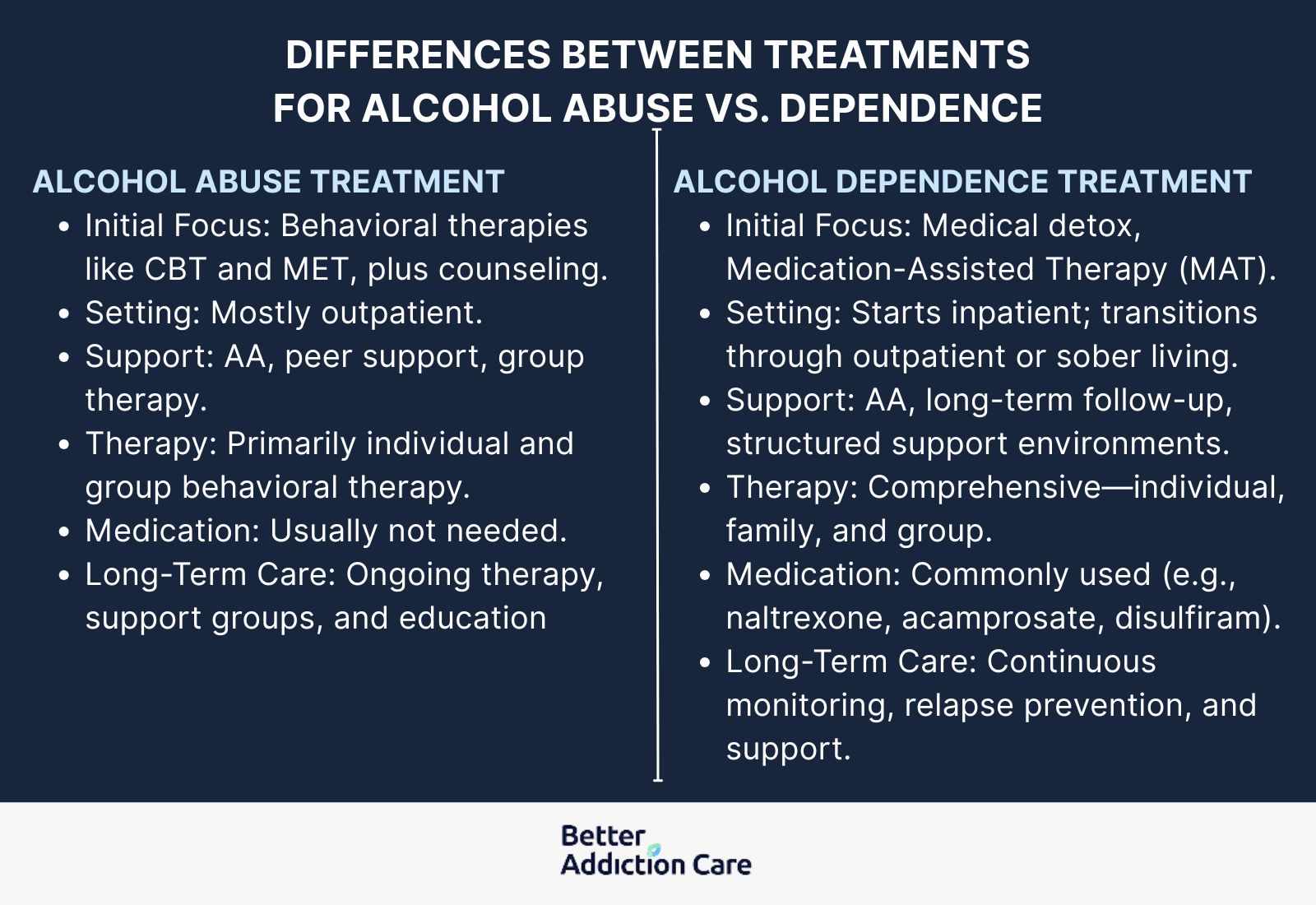
Is it Important to Seek Help for Alcohol Use Disorder?
Yes, seeking help for alcohol use disorder is extremely important because early professional support prevents problems from escalating and increases the chances of successful treatment. Individuals who recognize symptoms of alcohol use disorder and seek assistance access a wide range of services and programs designed to help them regain control of their lives. Early intervention allows individuals to address issues before they worsen, reducing the risk of long-term health consequences and enhancing recovery prospects.
Professional help provides specialized resources tailored to individual needs with alcohol use disorder. These include counseling, therapy, medication-assisted treatment, and support groups. These resources prove invaluable throughout recovery, offering guidance, encouragement, and practical strategies for managing cravings and preventing relapse. With support from qualified professionals and peers who understand their experiences, individuals develop the skills and resilience necessary to overcome challenges and maintain sobriety.
Can Binge Drinking Cause Alcohol Dependence?
Yes, binge drinking leads to alcohol dependence. Repeated episodes of heavy drinking alter brain chemistry, creating tolerance and eventually dependence. When someone regularly consumes large amounts of alcohol in short periods, their brain adapts to the substance's presence, requiring more to achieve the same effect.
This pattern disrupts normal neurotransmitter function in the brain. As this Binge drinking cycle continues, the body develops physical dependence, resulting in withdrawal symptoms when alcohol consumption stops. Simultaneously, psychological dependence forms as individuals begin relying on alcohol for stress relief or social confidence.


